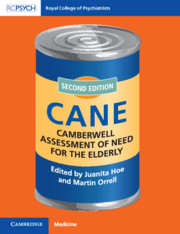Book contents
- Camberwell Assessment of Need for the Elderly
- Camberwell Assessment of Need for the Elderly (CANE)
- Copyright page
- Contents
- Figures
- Tables
- Contributors
- Acknowledgements
- Chapter 1 An Introduction to Needs Assessment and Use of the Camberwell Assessment of Need for the Elderly
- Chapter 2 Self-Reported Needs of People with Dementia Living at Home
- Chapter 3 Needs of Older Primary Care Patients
- Chapter 4 Unmet Needs of Older Persons with and Without Depression in Residential Homes
- Chapter 5 Needs of Older People Living Alone
- Chapter 6 Needs Assessment of People with Dementia and Impact of Caregiver Burden
- Chapter 7 Crisis and Assessment of Need in Dementia
- Chapter 8 Needs of People with Young-Onset Dementia
- Chapter 9 Needs of Older People in Long-Term Care Settings
- Chapter 10 Needs and Healthcare Costs in Old Age
- Chapter 11 The Future of Needs Assessment Research
- Instructions for the CANE
- Index
- References
Chapter 6 - Needs Assessment of People with Dementia and Impact of Caregiver Burden
Published online by Cambridge University Press: 10 June 2021
- Camberwell Assessment of Need for the Elderly
- Camberwell Assessment of Need for the Elderly (CANE)
- Copyright page
- Contents
- Figures
- Tables
- Contributors
- Acknowledgements
- Chapter 1 An Introduction to Needs Assessment and Use of the Camberwell Assessment of Need for the Elderly
- Chapter 2 Self-Reported Needs of People with Dementia Living at Home
- Chapter 3 Needs of Older Primary Care Patients
- Chapter 4 Unmet Needs of Older Persons with and Without Depression in Residential Homes
- Chapter 5 Needs of Older People Living Alone
- Chapter 6 Needs Assessment of People with Dementia and Impact of Caregiver Burden
- Chapter 7 Crisis and Assessment of Need in Dementia
- Chapter 8 Needs of People with Young-Onset Dementia
- Chapter 9 Needs of Older People in Long-Term Care Settings
- Chapter 10 Needs and Healthcare Costs in Old Age
- Chapter 11 The Future of Needs Assessment Research
- Instructions for the CANE
- Index
- References
Summary
Population structures are changing in many developed countries, and Korean society is currently one of the fastest ageing worldwide.1 This circumstance is due to a rapidly decreasing birth rate and an increasing life expectancy in recent decades, and this situation is likely to continue for a prolonged period. A national epidemiological investigation predicted that Korea will move from an ageing society to a ‘superaged’ society in only 25 years, from 2000 to 2025, with 46.5% (18.3 million) of the population expected to be older than 65 years by 2067.1 This demographic change gives rise to substantial challenges in dealing with increased demands on medical services relating to chronic and degenerative diseases, particularly related to the increasing prevalence of dementia in elderly patients (which was 9.2% in 2014).2 The care needs of community-residing people with dementia are complex and depend on the severity of dementia symptoms, such as cognitive impairment, functional dependencies and behavioural and psychological symptoms.3
- Type
- Chapter
- Information
- Camberwell Assessment of Need for the ElderlyCANE, pp. 52 - 61Publisher: Cambridge University PressPrint publication year: 2021
References
- 1
- Cited by



